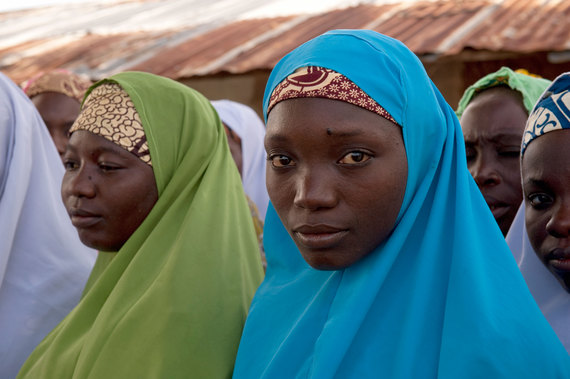This week, government officials, advocates, policymakers, corporate leaders, journalists, and others are in Copenhagen for Women Deliver, a major international conference focused on the health, rights, and well-being of women and girls. While women and girls have seen concrete improvements in their health and lives since the Millennium Development Goals were adopted in 2001, the right to a safe abortion remains elusive for too many. An estimated 20 million women and girls undergo an unsafe abortion each year, the overwhelming majority in developing countries. An estimated 47,000 women and girls die every year as a result--more than 800 a day--and thousands more experience grave injuries.
The United States bears significant responsibility for this state of affairs. U.S. laws and funding restrictions--and the very way we talk about abortion--are incredibly damaging globally. The U.S. policy on abortion fails women around the world in three fundamental ways.
First, U.S. policies and rhetoric fail to recognize that safe abortion is an integral component of reproductive health care and that it is a human right. The U.S. government--and many civil society organizations--prefer to stick to "safer" issues like family planning, skirting the fact that abortion is part of the full spectrum of sexual and reproductive health and rights. Even more, U.S. leaders and policymakers are wary of using rights-based language when speaking about abortion because they fear that human rights demand a higher level of action and leadership. They're right about that. Since a woman's ability to control her body, her sexuality, and her reproduction is a human right, we should be asking our leaders to uphold it.
Second, U.S. policies fail to recognize that abortion should be available in all circumstances. The infamous Helms Amendment prohibits U.S. foreign aid funding for abortion "as a method of family planning." Yet the Obama Administration has continued to misinterpret this restriction as a blanket prohibition on funding all abortion overseas--even in cases of rape, incest, or when the life of the woman is in danger. Yet in none of these cases is abortion a form of family planning.
The International Women's Health Coalition (IWHC) and others have been advocating for the U.S. government to correctly interpret the Helms Amendment--by the letter of the law. This is crucial because the United States is the largest single funder of women's health programs globally; what it says and does matters. These restrictions have a terrible chilling effect in the field. Yesterday at the Conference, at a panel organized by IWHC, CHANGE, Advocates for Youth, and Pathfinder, panelists and members of the audience recounted examples of the damaging impact of Helms on reproductive health programs--from Kenya to Mozambique.
The problems with the Helms amendment run even deeper than its interpretation. Its wording perpetuates a good girl/bad girl dichotomy, and sends the message that women should only have access to abortion if it isn't their fault they became pregnant. This is at odds with the reality of women's lives; there are myriad reasons women seek abortions.
At the panel, U.S.-based abortion provider Dr. Willie Parker called this "the politics of respectability." He warned the assembled advocates against fitting abortion into respectability boxes, like cases of rape or severe fetal abnormalities. Dr. Parker emphasized that the only justification a woman needs for an abortion is the fact that she is pregnant and doesn't want to be. Precisely.
Lastly, the United States has failed to recognize that abortion should be legal everywhere and for everyone. U.S. policymakers--and even many international women's health activists--limit themselves to improving access to abortion "where it is not against the law." They are often reluctant to call for access to abortion in countries where access is restricted by law. Yet, over two decades ago, 189 countries adopted the landmark Beijing Platform for Action, which called on governments to review laws that penalize women who have undergone illegal abortions. Punitive laws are directly linked to higher rates of unsafe abortion, a major cause of maternal mortality. They increase stigma about abortion, and undermine women's access to postabortion care, counseling, education, and, in many cases, contraceptive services. Laws prohibiting abortion do not in fact reduce the number of abortions, but make them unsafe.
Meanwhile, many countries have faced these facts and are liberalizing their abortion laws--from Nepal to Uruguay, from Mozambique to Chile. Not only does the United States ignore this important trend, but every year Congress passes the Siljander Amendment to appropriations, to bar the use of any U.S. foreign assistance funds from being used to advocate on abortion. On any other human rights issue, we would not accept national laws as an excuse for violations, but would support domestic activists working to change the situation. Why should abortion be different?
At Women Deliver, activists have highlighted diplomacy as a way the United States can show leadership without running afoul of congressional restrictions on abortion. While the Helms amendment and other legislation limit what the U.S. government can fund, Administration officials can say whatever they want. The U.S. government should use its voice to support, at all levels, abortion rights and access. As an organization active at the United Nations, IWHC has repeatedly seen firsthand how powerful this approach, when utilized, can be.
Over many years, I've met countess women who shared horror stories of what they endured because they couldn't access safe abortion. Without a change in U.S. policy, women around the world--from Nigeria to Haiti--will continue to be denied these critical services. It's time the United States--the current Administration and the next one--upholds its Beijing commitments and urges other countries to do the same.
Photo: Arne Hoel/World Bank
